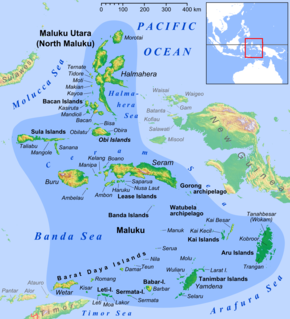
The Maluku Islands or the Moluccas (Molukken) are an archipelago in eastern Indonesia. Tectonically they are located on the Halmahera Plate within the Molucca Sea Collision Zone. Geographically they are located east of Sulawesi, west of New Guinea, and north and east of Timor. Lying within Wallacea, the Maluku islands have been considered part of both Asia and Oceania.

The Bacan Islands, formerly also known as the Bachans, Bachians, and Batchians, are a group of islands in the Moluccas in Indonesia. They are mountainous and forested, lying south of Ternate and southwest of Halmahera. The islands are administered by the South Halmahera Regency of North Maluku Province. They formerly constituted the Sultanate of Bacan.

North Maluku is a province of Indonesia. It covers the northern part of the Maluku Islands, bordering the Pacific Ocean to the north, the Halmahera Sea to the east, the Molucca Sea to the west, and the Seram Sea to the south. The provincial capital is Sofifi on the largest island of Halmahera, while the largest city is the island city of Ternate. The population of North Maluku was 1,038,087 in the 2010 census, making it one of the least-populous provinces in Indonesia, but by the 2020 Census the population had risen to 1,278,764.
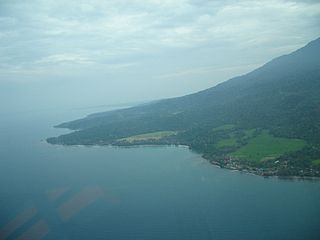
Halmahera, formerly known as Jilolo, Gilolo, or Jailolo, is the largest island in the Maluku Islands. It is part of the North Maluku province of Indonesia, and Sofifi, the capital of the province, is located on the west coast of the island.
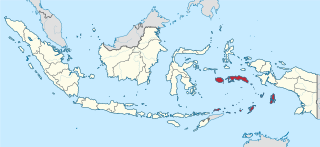
Maluku is a province of Indonesia. It comprises the central and southern regions of the Maluku Islands. The main city and capital of Maluku province is Ambon on the small Ambon Island. The land area is 62,946 km2, and the total population of this province at the 2010 census was 1,533,506 people, rising to 1,848,923 at the 2020 Census. Maluku is located in Eastern Indonesia. It is directly adjacent to North Maluku and West Papua in the north, Central Sulawesi, and Southeast Sulawesi in the west, Banda Sea, East Timor and East Nusa Tenggara in the south and Arafura Sea and Papua in the east.

Ternate is the largest city in the Indonesian province of North Maluku and an island in the Maluku Islands. It was the capital of the former Sultanate of Ternate and de facto provincial capital of North Maluku before Sofifi on the nearby coast of Halmahera became the capital in 2010. It is off the west coast of the much larger island of Halmahera. Ternate island itself has 194,477 inhabitants in an area of 101.67 km2 in 2020; including nearby islands which form part of the city administratively, the city has a population of 205,001 on some 162.17 km2.

Tidore is a city, island, and archipelago in the Maluku Islands of eastern Indonesia, west of the larger island of Halmahera. Part of North Maluku Province, the city includes the island of Tidore together with a large part of Halmahera Island to its east. In the pre-colonial era, the Sultanate of Tidore was a major regional political and economic power, and a fierce rival of nearby Ternate, just to the north.

The West Papuan languages are a proposed language family of about two dozen non-Austronesian languages of the Bird's Head Peninsula of far western New Guinea, the island of Halmahera and its vicinity, spoken by about 220,000 people in all. It is not established if they constitute a proper linguistic family or an areal network of genetically unrelated families.

The Sultanate of Ternate, previously also known as The Kingdom of Gapi is one of the oldest Muslim kingdoms in Indonesia besides Tidore, Jailolo, and Bacan. The Ternate kingdom was established by Momole Cico, the first leader of Ternate, with the title Baab Mashur Malamo, traditionally in 1257. It reached its Golden Age during the reign of Sultan Baabullah (1570–1583) and encompassed most of the eastern part of Indonesia and a part of southern Philippines. Ternate was a major producer of cloves and a regional power from the 15th to 17th centuries.

Sultanate of Tidore was a sultanate in Southeast Asia, centered on Tidore in the Spice Islands. It was also known as Duko, its ruler carrying the title Kië ma-kolano. Tidore was a rival of the Sultanate of Ternate for control of the spice trade, and had an important historical role as binding the archipelagic civilizations of Indonesia to the Papuan world.

North Halmahera Regency is a regency of North Maluku Province, Indonesia. It was declared a Regency on 31 May 2003. The capital town of the regency lies at the port of Tobelo. The Regency, which has been considerably reduced by the separation of Tidore and of Morotai Island, now covers an area of 3,896.9 square kilometres (1,504.6 sq mi) and had a population of 161,847 people at the 2010 Census and 179,783 at the 2015 Intermediate Census. The latest official estimate is 199,935. The principal settlements are Tobelo, Kao and Galela. The area is noted for its white beaches and coral reefs.

Ternate or Ternatese is a North Halmahera language of eastern Indonesia. It is spoken on the island of Ternate, and some neighboring areas in North Maluku, including Halmahera, Hiri, Kayoa and the Bacan Islands. Historically, it served as the primary language of the Sultanate of Ternate, famous for its role in the spice trade. A North Halmahera language, it is unlike most languages of Indonesia which belong to the Austronesian language family.
The North Halmahera languages are a family of languages spoken in the northern and eastern parts of the island of Halmahera and some neighboring islands in Indonesia. The southwestern part of the island is occupied by the unrelated South Halmahera languages, which are a subgroup of Austronesian. They may be most closely related to the languages of the Bird's Head region of West Papua, but this is not well-established.

American Samoa is an unincorporated territory of the United States, located South East of Samoa and consisting of seven main islands. American Samoa is predominately a Christian nation, identifying as a region founded by God, however, has become more religiously diverse since the mid-20th Century. The religion of Islam was first brought to American Samoa in the mid-1980s by Muslim expatriate workers from government programs. The region received their first native convert in 1985, although Muslim adherents still remain a small minority in American Samoan society today. While the population is small, the spread of Islam has been a significant part of the Island’s history. As a result of increased terrorist activities globally in the early 2000s, specifically the Bali bombing which targeted American Samoa’s neighbours, the islands imposed a strict ban on residents of 23 nations from entering their territory without explicit permission from the island’s attorney general’s office. Most of the countries banned were either located in the Middle East and identified as Muslim nations, or were home to a large number of Muslim adherents.
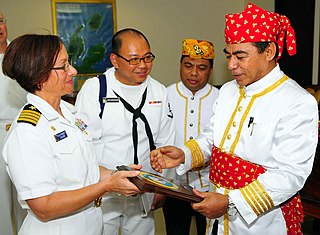
Tobelo people is one of the northern Halmahera peoples living in eastern Indonesia, in the northern part of the Maluku Islands and in the eastern side of North Halmahera Regency.

The 2019 North Maluku earthquake, a shallow 7.2 magnitude earthquake, struck the island of Halmahera, North Maluku, Indonesia on 14 July 2019 at 18:10 local time with its epicentre located at South Halmahera. It struck at a shallow depth of 10 km (6.2 mi) near Labuha, a small port town located in Bacan Island. The earthquake produced a non-destructive 20 cm tsunami, which stuck Labuha just minutes after the shaking started. 14 people were killed by the earthquake while 129 people were injured, and more than 50,000 people were displaced. The earthquake inflicted a total damage of Rp 238 billion.
Sultan Hairun Jamilu was the 6th Muslim ruler of Ternate in Maluku, reigning from 1535 to 1570. During his long reign, he had a shifting relation to the Portuguese who had a stronghold in Ternate and tried to dominate the spice trade in the region. This ended with his assassination at the hands of a Portuguese soldier in 1570.
Sultan Saifuddin, also known as Golofino was the eleventh Sultan of Tidore in Maluku islands. Reigning from 1657 to 1687, he left Tidore's old alliance with the Spanish Empire and made treaties with the Dutch East India Company (VOC), which now became hegemonic in Maluku for the next century. Tidore was forced to extirpate the clove trees in its territory and thus ceased to be a spice Sultanate. In spite of this, Saifuddin and his successors were able to preserve a degree of independence due to the trade in products from the Papuan Islands and New Guinea.
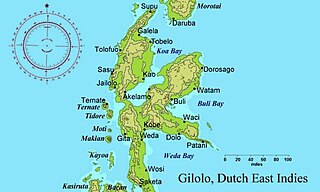
The Sultanate of Jailolo was a premodern state in Maluku, modern Indonesia that emerged with the increasing trade in cloves in the Middle Ages. Also spelt Gilolo, it was one of the four kingdoms of Maluku together with Ternate, Tidore, and Bacan, having its center at a bay on the west side of Halmahera. Jailolo existed as an independent kingdom until 1551 and had separate rulers for periods after that date. A revivalist Raja Jailolo movement made for much social and political unrest in Maluku in the 19th century. In modern times the sultanate has been revived as a symbolic entity.
Sultan Haji Djafar Syah was the titular Sultan of Tidore from 1999 to 2012. He was the 36th ruler of the island kingdom according to traditional reckoning, and revived the sultanate as a cultural institution after a long vacancy since 1967. The beginning of his term was turbulent since it coincided with the Maluku sectarian conflict in 1999–2001. However, Tidore Island was largely spared from the violence.
















